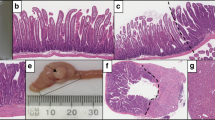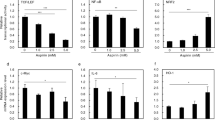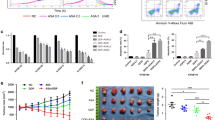Summary
The induction of cell death by aspirin was analysed in HT-29 colon carcinoma cells. Aspirin induced two hallmarks of apoptosis: nuclear chromatin condensation and increase in phosphatidylserine externalization. However, aspirin did not induce either oligonucleosomal fragmentation of DNA, decrease in DNA content or nuclear fragmentation. The effect of aspirin on Annexin V binding was inhibited by the caspase inhibitor Z-VAD.fmk, indicating the involvement of caspases in the apoptotic action of aspirin. However, aspirin did not induce proteolysis of PARP, suggesting that aspirin does not increase nuclear caspase 3-like activity in HT-29 cells. This finding may be related with the ‘atypical’ features of aspirin-induced apoptosis in HT-29 cells.
Similar content being viewed by others
Article PDF
Change history
16 November 2011
This paper was modified 12 months after initial publication to switch to Creative Commons licence terms, as noted at publication
References
Arber, N, Han, EK, Sgambato, A, Piazza, GA, Delohery, TM, Begemann, M, Weghorst, CM, Kim, NH, Pamukcu, R, Ahnen, DJ, Reed, JC, Weinstein, IB & Holt, PR (1997). A K-ras oncogene increase resistance to sulindac-induced apoptosis in rat enterocytes. Gastroenterology 113: 1892–1900.
Barnes, CJ, Cameron, IL, Hardman, WE & Lee, M (1998). Non-steroidal anti-inflammatory drug effect on crypt cell proliferation and apoptosis during initiation of rat colon carcinogenesis. Br J Cancer 77: 573–580.
Bellosillo, B, Pique, M, Barragan, M, Castaño, E, Villamor, N, Colomer, D, Montserrat, E, Pons, G & Gil, J (1998). Aspirin and salicylate induce apoptosis and activation of caspases in B-cell chronic lymphocytic leukemia cells. Blood 92: 1406–1414.
Beg, AA & Baltimore, D (1996). An essential role for NF-κB in preventing TNF-α-induced cell death. Science 274: 782–784.
Boddie, AW, Constantinou, A, Williams, C & Reed, A (1998). Nitrogen mustard up-regulates Bcl-2 and GSH and increases NTP and PCr in HT-29 colon cancer cells. Br J Cancer 77: 1395–1404.
Bonnotte, B, Favre, N, Reveneau, S, Micheau, O, Droin, N, Garrido, C, Fontana, A, Chauffert, B, Solary, E & Martin, F (1998). Cancer cell sensitization to Fas-mediated apoptosis by sodium butyrate. Cell Death and Differ 5: 480–487.
Boolbol, SK, Dannenberg, AJ, Chadburn, A, Martucci, C, Guo, XJ, Ramonetti, JT, Abreu-Goris, M, Newmark, HL, Lipkin, ML, DeCosse, JJ & Bertagnolli, MM (1996). Cyclooxygenase-2 overexpression and tumor formation are blocked by sulindac in a murine model of familial adenomatous polyposis. Cancer Res 56: 2556–2560.
Castaño, E, Dalmau, M, Marti, M, Berrocal, F, Bartrons, R & Gil, J (1997). Inhibition of DNA synthesis by aspirin in Swiss 3T3 cell fibroblasts. J Pharmacol Exp Ther 280: 366–372.
Cohen, GM (1997). Caspases: the executioners of apoptosis. Biochem J 326: 1–16.
Cryns, V & Yuan, J (1998). Proteases to die for. Genes Dev 12: 1551–1557.
Duke, RC & Cohen, JJ (1992). Morphological and biochemical assays of apoptosis. In:Current Protocols in Immunology, Coligan JE, Kruisbeak AM (eds), John Wiley & Sons: New York 3.17.1–3.17.16.
Efstathiou, JA, Noda, M, Rowan, A, Dixon, C, Chinery, R, Jawhari, A, Hattori, T, Wright, NA, Bodmer, WF & Pignatelli, M (1998). Intestinal trefoil factor controls the expression of the adenomatous polyposis coli-catenin and E-cadherin-catenin complexes in human colon carcinoma cells. Proc Natl Acad Sci USA 95: 3122–3127.
Elder, DJ & Paraskeva, C (1998). COX-2 inhibitors for colorectal cancer. Nat Med 4: 392–393.
Elder, DJ, Hague, A, Hicks, DJ & Paraskeva, C (1996). Differential growth inhibition by the aspirin metabolite salicylate in human colorectal tumor cell lines: enhanced apoptosis in carcinoma and in vitro-transformed adenoma relative to adenoma cell lines. Cancer Res 56: 2273–2276.
Elder, DJE, Halton, DE, Hague, A & Paraskeva, C (1997). Induction of apoptotic cell death in human colorectal carcinoma cell lines by a cyclooxygenase 2 (COX-2) selective nonsteroidal anti inflammatory drug: independence from COX 2 protein expression. Clin Cancer Res 3: 1679–1983.
Gupta, RA & DuBois, RN (1998). Aspirin, NSAIDs, and colon carcer prevention: mechanisms?. Gastroenterology 114: 1095–1100.
Hall, PA, Coates, PJ, Ansari, B & Hopwood, D (1994). Regulation of cell number in the mammalian gastrointestinal tract: the importance of apoptosis. J Cell Sci 107: 3569–3577.
Heerdt, BG, Houston, MA & Augenlicht, LH (1994). Potentiation by specific short-chain fatty acids of differentiation and apoptosis in human colonic carcinoma cell lines. Cancer Res 54: 3288–3294.
Han, EK, Arber, N, Yamamoto, H, Lim, JT, Delohery, T, Pamukcu, R, Piazza, GA, Xing, WQ & Weinstein, IB (1998). Effects of sulindac and its metabolites on growth and apoptosis in human mammary epithelial and breast carcinoma cell lines. Breast Cancer Res Treat 48: 195–203.
Hannun, YA (1997). Apoptosis and the dilemma of cancer chemotherapy. Blood 89: 1845–1853.
Hoffman, B & Liebermann, DA (1994). Molecular control of apoptosis: differentiation/growth arrest primary response genes, proto-oncogenes, and tumor supressor genes as positive and negative modulators. Oncogene 9: 1807–1812.
Janicke, RU, Sprengart, ML, Wati, MR & Porter, AG (1998). Caspase-3 is required for DNA fragmentation and morphological changes associated with apoptosis. J Biol Chem 273: 9357–9360.
Kopp, E & Ghosh, S (1994). Inhibition of NF-κB by sodium salicylate and aspirin. Science 265: 956–959.
Laemmli, UK (1970). Cleavage of structural proteins during the assembly of the head of bacteriophage T4. Nature 227: 680–685.
Liu, ZG, Hsu, H, Goeddel, DV & Karin, M (1996). Dissection of TNF receptor 1 effector functions. JNK activation is not linked to apoptosis while NF-κB activation prevents cell death. Cell 87: 565–576.
Lu, X, Xie, W, Reed, D, Bradshaw, WS & Simmons, DL (1995). Nonsteroidal antiinflammatory drugs cause apoptosis and induce cyclooxygenases in chicken embryo fibroblasts. Proc Natl Acad Sci USA 92: 7961–7965.
Mangiarotti, R, Danova, M, Alberici, R & Pellicciari, C (1998). All-trans retinoic acid (ATRA)-induced apoptosis is preceded by G1 arrest in human MCF-7 breast cancer cells. Br J Cancer 77: 186–191.
Martin, SJ, Finucane, DM, Amarante-Mendes, GP, O’Brien, GA & Green, DR (1996). Phosphatidylserine externalization during CD95-induced apoptosis of cells and cytoplasts requires ICE/CED-3 protease activity. J Biol Chem 271: 28753–28756.
Mosmann, T (1983). Rapid colorimetric assay for cellular growth and survival: application to proliferation and cytotoxicity assays. J Immunol Methods 65: 55–63.
Oberhammer, F, Wilson, JW, Dive, C, Morris, ID, Hickman, JA, Wakeling, AE, Walker, PR & Sikorska, M (1993). Apoptotic death in epithelial cells: cleavage of DNA to 300 and/or 50 kb fragments prior to or in the absence of internucleosomal fragmentation. EMBO J 12: 3679–3684.
Pasricha, PJ, Bedi, A, O’Connor, K, Rashid, A, Akhtar, AJ, Zahurak, ML, Piantadosi, S, Hamilton, SR & Giardiello, FM (1995). The effects of sulindac on colorectal proliferation and apoptosis in familial ademonatous polyposis. Gastroenterology 109: 994–998.
Piazza, GA, Rahm, AL, Krutzsch, M, Sperl, G, Paranka, NS, Gross, PH, Brendel, K, Burt, RW, Alberts, DS, Pamukcu, R & Ahnen, DJ (1995). Antineoplastic drugs sulindac sulfide and sulfone inhibit cell growth by inducing apoptosis. Cancer Res 55: 3110–3116.
Piazza, GA, Rahm, AK, Finn, TS, Fryer, BH, Li, H, Stoumen, AL, Pamukcu, R & Ahnen, DJ (1997). Apoptosis primarily accounts for the growth-inhibitory properties of sulindac metabolites and involves a mechanism that is independent of cyclooxygenase inhibition, cell cycle arrest, and p53 induction. Cancer Res 57: 2452–2459.
Qiao, L, Hanif, R, Sphicas, E, Shiff, SJ & Rigas, B (1998). Effect of aspirin on induction of apoptosis in HT-29 human colon adenocarcinoma cells. Biochem Pharmacol 55: 53–64.
Ricchi, P, Pignata, S, Dipopolo, A, Memoli, A, Apicella, A, Zarrilli, R & Acquaviva, AM (1997). Effect of aspirin on cell proliferation and differentiation of colon adenocarcinoma Caco-2 cells. Int J Cancer 73: 880–884.
Schwenger, P, Alpert, D, Skolnik, EY & Vilcek, J (1998). Activation of p38 mitogen-activated protein kinase by sodium salicylate leads to inhibition of tumor necrosis factor-induced I kappaB alpha phosphorylation and degradation. Mol Cell Biol 18: 78–84.
Shao, RG, Shimizu, T & Pommier, Y (1997). 7-Hydroxystaurosporine (UCN-01) induces apoptosis in human colon carcinoma and leukemia cells independently of p53. Exp Cell Res 234: 388–397.
Shiff, SJ & Rigas, B (1997). Nonsteroidal anti-inflammatory drugs and colorectal cancer: evolving concepts of their chemopreventive actions. Gastroenterology 113: 1992–1998.
Shiff, SJ, Qiao, L, Tsai, LL & Rigas, B (1995). Sulindac sulfide, an aspirin-like compound, inhibits proliferation, causes cell cycle quiescence, and induces apoptosis in HT-29 colon adenocarcinoma cells. J Clin Invest 96: 491–503.
Shiff, SJ, Koutsos, MI, Qiao, L & Rigas, B (1996). Non steroidal antiinflammatory drugs inhibit the proliferation of colon adenocarcioma cells: effects on cell cycle and apoptosis. Exp Cell Res 222: 179–188.
Smalley, WE & DuBois, RN (1997). Colorectal cancer and nonsteroidal anti-inflammatory drugs. Adv Pharmacol 39: 1–20.
Smith, WL (1989). The eicosanoids and their biochemical mechanism of action. Biochem J 259: 315–324.
Subbegowda, R & Frommel, TO (1998). Aspirin toxicity for human colonic tumor cells results from necrosis and is accompanied by cell cycle arrest. Cancer Res 58: 2772–2776.
Tsujii, M & Dubois, RN (1995). Alterations in cellular adhesion and apoptosis in epithelial cells overexpressing prostaglandin endoperoxide synthase 2. Cell 83: 493–501.
Tsujii, M, Kawano, S, Tsuji, S, Sawaoka, H, Hori, M & DuBois, RN (1998). Cyclooxygenase regulates angiogenesis induced by colon cancer cells. Cell 93: 705–716.
Vanags, DM, Porn-Ares, MI, Coppola, S, Burgess, DH & Orrenius, S (1996). Protease involvement in fodrin cleavage and phosphatidylserine exposure in apoptosis. J Biol Chem 271: 31075–31085.
Van Antwerp, DJ, Martin, SJ, Kafri, T, Green, DR & Verma, IM (1996). Suppression of TNF-α-induced apoptosis by NF-κB. Science 274: 787–789.
Van Engeland, M, Nieland, LJ, Ramaekers, FC, Schutte, B & Reutelingsperger, CP (1998). Annexin V-affinity assay: a review on an apoptosis detection system based on phosphatidylserine exposure. Cytometry 31: 1–9.
Vane, JR (1971). Inhibition of prostaglandin synthesis as a mechanism of action for aspirin-like drugs. Nature New Biol 231: 232–235.
Wang, CY, Mayo, MW & Baldwin, AS (1996). TNF and cancer therapy-induced apoptosis: potentiation by inhibition of NF-κB in preventing TNF-α-induced cell death. Science 274: 784–787.
Woo, M, Hakem, R, Soengas, MS, Duncan, GS, Shahinian, A, Kagi, D, Hakem, A, McCurrach, M, Khoo, W, Kaufman, SA, Senaldi, G, Howard, T, Lowe, SW & Mak, TW (1998). Essential contribution of caspase 3/CPP32 to apoptosis and its associated nuclear changes. Genes Dev 12: 806–819.
Yin, MJ, Yamamoto, Y & Gaynor, RB (1998). The anti-inflammatory agents aspirin and salicylate inhibit the activity of I(kappa)B kinase-beta. Nature 396: 77–80.
Zapata, JM, Krajewska, M, Krajewski, S, Huang, RP, Takayama, S, Wang, HG, Adamson, E & Reed, JC (1998). Expression of multiple apoptosis-regulatory genes in human breast cancer cell lines and primary tumors. Breast Cancer Res Treat 47: 129–140.
Author information
Authors and Affiliations
Rights and permissions
From twelve months after its original publication, this work is licensed under the Creative Commons Attribution-NonCommercial-Share Alike 3.0 Unported License. To view a copy of this license, visit http://creativecommons.org/licenses/by-nc-sa/3.0/
About this article
Cite this article
Castaño, E., Dalmau, M., Barragán, M. et al. Aspirin induces cell death and caspase-dependent phosphatidylserine externalization in HT-29 human colon adenocarcinoma cells. Br J Cancer 81, 294–299 (1999). https://doi.org/10.1038/sj.bjc.6690690
Received:
Revised:
Accepted:
Published:
Issue date:
DOI: https://doi.org/10.1038/sj.bjc.6690690
Keywords
This article is cited by
-
Cyclooxygenase-independent effects of aspirin on HT-29 human colon cancer cells, revealed by oligonucleotide microarrays
Biotechnology Letters (2006)
-
Evidence for colorectal cancer cell specificity of aspirin effects on NFκB signalling and apoptosis
British Journal of Cancer (2004)
-
β2-microglobulin induces apoptosis in HL-60 human leukemia cell line and its multidrug resistant variants overexpressing MRP1 but lacking Bax or overexpressing P-glycoprotein
Oncogene (2001)



